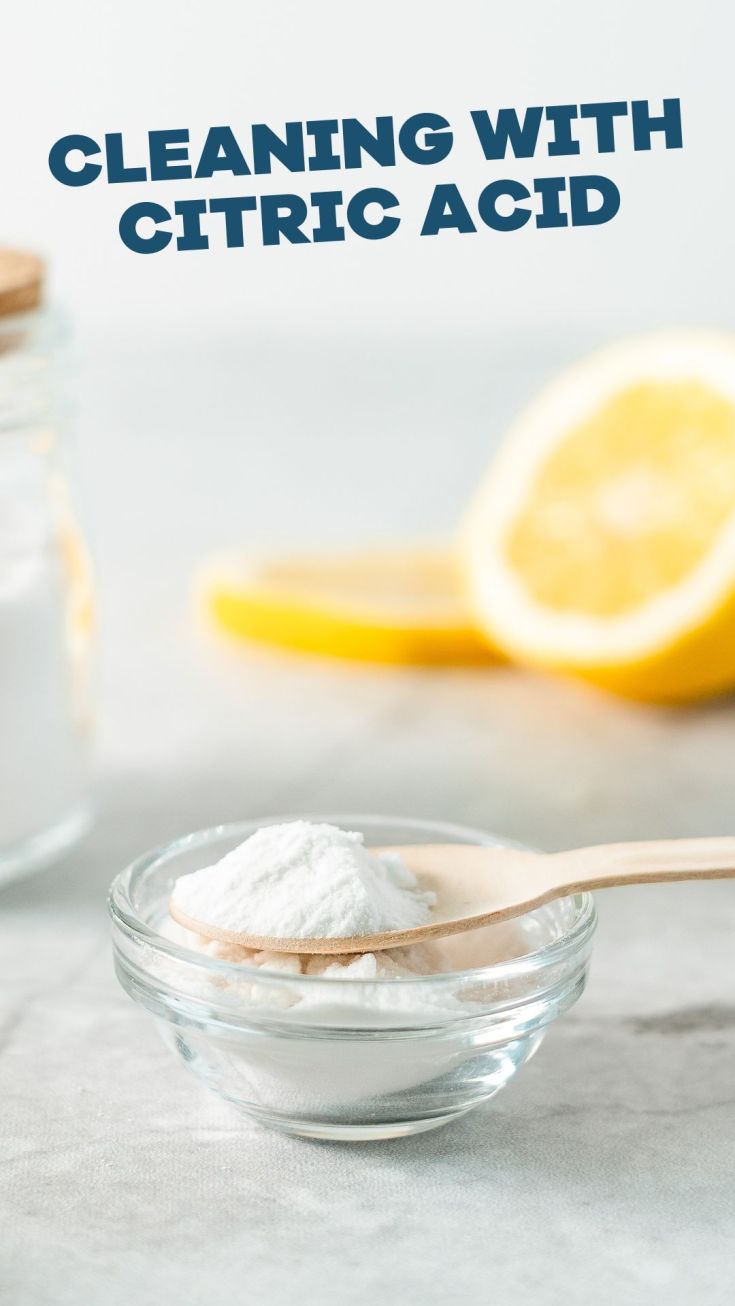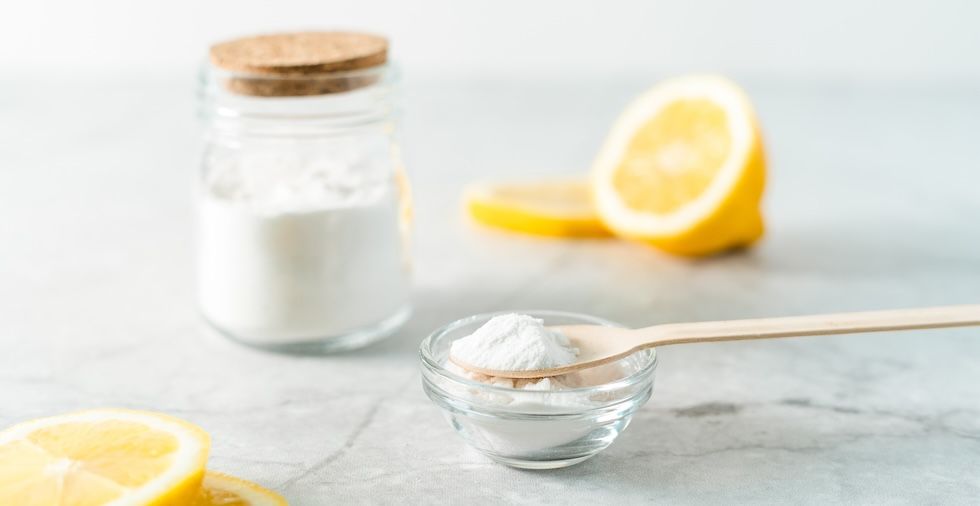- What is citric acid?
- Why should you use citric acid?
- How to use citric acid for cleaning
- How to descale things with citric acid
- How to remove rust with citric acid
- How to clean taps and showerheads with citric acid
There are plenty of cleaning products on the market, but what if you want a natural solution? We have you covered. Using citric acid for cleaning can transform the way you get things done. Whether you need to cut through difficult grease or clean up some grime, this natural substance will allow you to do the job. So, what do you need to know to get started?
In this guide, we’ll cover the basics—what citric acid is, what makes it an effective cleaner, and the main ways to start using it. Read on to learn our top tricks and tips.
What is citric acid?
First things first, let’s talk about what citric acid is. Chances are, you can find some in your fruit bowl at home. Citric acid is a naturally occurring compound in citrus fruits like lemons, oranges, and limes.
The most common option is to get citric acid powder to use at home. This solution is widely used in food, medicine, and cosmetics. However, it has many more uses, including as an effective cleaning agent.
That’s because citric acid can break down limescale, dissolve rust, and eliminate bacteria. If you’re looking for a great alternative to harsh chemical cleaners, you may want to try this. It’s easier than you think to get started. As a bonus, citric acid also smells terrific, making your home smell fresh and clean whenever you use it.
Why should you use citric acid?
Before we look at the ways that you can use citric acid for cleaning, let’s delve into why you should use it. Here are some of the main reasons that you should try this option:
Eco-friendly
Trying to find eco-friendly products can be difficult. However, citric acid is 100% natural, meaning it could be the perfect solution. It may also be safer for you and your home than chemical-based cleaners. Put simply, it breaks down naturally without harming the environment.
Effective
It doesn’t end there. One of the biggest advantages of using citric acid for cleaning is its effectiveness. Thanks to its natural acidity, it has the power to cut through grease and grime.
Remove limescale
When you’re dealing with limescale build-up, citric acid is a game-changer. The solution is ideal for build-ups on kettles, taps, and showerheads.
Dissolves rust
Want to restore your metal surfaces? When things get rusty, reaching for some citric acid is the easiest way. Research suggests that this is a common way to remove rust from metals.
Kills bacteria and mould
Did you know that citric acid is a natural disinfectant? For that reason, you can use this natural product to get rid of germs in your house. When trying to do that, it’s wise to make sure that you attack the area directly with the citric acid.
How to use citric acid for cleaning
Ready to start using citric acid for cleaning? Let’s look at different ways to use this natural solution in your home. Here’s what you need to know.
How to clean a kettle with citric acid
You know the deal: Limescale builds up inside kettles over time, especially in hard water areas. If you’re looking for a way to remove it, you might want to use citric acid.
Step 1: Fill the kettle halfway with water.
Step 2: Add one to two tablespoons of citric acid powder.
Step 3: boil the kettle and leave it to sit for 15-20 minutes.
Step 4: When that’s done, pour out all of the solution
Step 5: Be sure to rinse the inside of your kettle well to get rid of any residue.
Step 6: Finally, boil fresh water in the kettle once to remove excess.
If you do this regularly, you should have no problem keeping your kettle limescale-free.
How to clean a toilet with citric acid
Here’s a less savoury cleaning task. Toilets can also suffer from stubborn limescale and stains. Luckily, you can also use citric acid to help get rid of the stains and marks.
Step 1: Pour 2-3 tablespoons of citric acid powder into the toilet bowl.
Step 2: Let it sit for at least an hour. If you’re dealing with tough stains, leave it overnight.
Step 3: Scrub the toilet bowl with the toilet bowl brush. When you’re done, flush away the excess.
This approach removes stains and leaves the bowl sparkling clean. You can always try again if it fails the first time.
How to descale things with citric acid
Hard water can leave nasty deposits in dishwashers, coffee machines, and washing machines. Citric acid is a natural descaler that can solve this problem.
How to descale dishwashers and washing machines
You’ll need to take a similar approach for washing machines and dishwashers. Follow the steps below to get it right.
Step 1: Add 4-5 tablespoons of citric acid to the detergent compartment.
Step 2: Run an empty hot cycle. Check your machine’s settings to see the options.
Step 3: Finally, wipe any residue. You can repeat this if you need to.
How to descale your coffee machine with citric acid
If your coffee machine needs descaling, grab some citric acid and start. Here’s what you need to do:
Step 1: Mix one tablespoon of citric acid with around a litre of water.
Step 2: Next, run the solution through the machine.
Step 3: Finally, rinse with fresh water.
How to remove rust with citric acid
As we’ve already covered, you can clean rusty tools, sinks, and metal surfaces with citric acid. You might not know where to start. Follow the simple process below:
Step 1: Dissolve 2-3 tablespoons of citric acid in warm water.
Step 2: Soak the rusty item for a few hours or overnight.
Step 3: You can then scrub off the rust with a brush or cloth.
Step 4: Rinse the metal and make sure that you dry thoroughly.
How to clean taps and showerheads with citric acid
When your taps and showerheads look worse for wear, you need to do something about it. Mineral build-up on taps and showerheads can be annoying. Restoring their shine can be easy when you use some citric acid. Here’s how:
Step 1: Mix a few tablespoons of citric acid with warm water.
Step 2: Soak a cloth in the solution and wrap it around taps or showerheads.
Step 3: Leave the cloth on the metal for at least an hour. (The longer, the better!)
Step 4: When the citric acid has worked its cleaning magic, wipe clean and rinse.
Ready to give it a go? Citric acid is a powerful, natural cleaning product. You can easily tackle limescale, rust, and grime without using any nasty harsh chemicals. It doesn’t end there. It’s also cheap, eco-friendly, and easy to use. What more can you ask for? In this guide, we’ve shared a wealth of ways to use citric acid for cleaning. Why not get started now?
Q&A
Looking for some more answers? We’ve got you covered. Here are some of the frequently asked questions about citric acid:
Is citric acid the same as vinegar?
No, these are different things. However, they have similar benefits. Citric acid comes in solid powder form, while vinegar is a liquid. Both are acidic and effective for cleaning.
Is citric acid safe for septic tanks?
Yes, citric acid is biodegradable and won’t harm your septic systems. If you’re looking for a safe and eco-friendly product, you won’t go far wrong with this one.
Does citric acid disinfect?
As this guide has covered, citric acid has mild antibacterial properties. However, it is not as strong as bleach or alcohol-based disinfectants. Choose the product that best suits your needs and your home cleaning tasks.
Is citric acid in lemon juice?
Yes! It is in most citrus fruits, as the name applies. Lemon juice contains as much as 8% citric acid, making it an effective natural cleaner. However, if you’re looking for something stronger, investing in some citric acid powder may be better. The choice is yours.
Can I use citric acid on marble?
No, you should not make this all-too-common mistake. Citric acid can etch marble and other natural stones and may do more damage than good. When cleaning these materials, always use a pH-neutral cleaner.


Leave a Reply